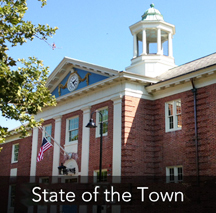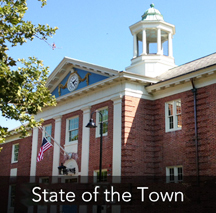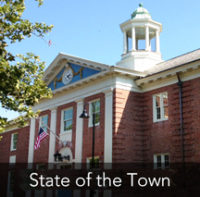As the population in the MetroWest area keeps growing, Lincoln will have to decide how to allow more housing and businesses — or whether it even wants to.
In an effort to direct growth around the MBTA station in Lincoln, the South Lincoln Planning and Implementation Committee presented a draft of proposing zoning changes at the November 2 State of the Town meeting. Since Oriole Landing was approved, the town won’t face pressure for dense affordable housing developments for at least another decade — but several surrounding towns are not so lucky, Selectman Jennifer Glass noted in her “Setting the Context” presentation.
Neighboring communities are being forced to entertain 40B housing projects, which are allowed to circumvent many zoning restrictions for height and density in towns that have fallen short of state requirements for affordable housing. Hundreds of units (not all of them designated affordable) have been proposed or built in Sudbury, Wayland, Weston, and West Concord, Glass noted.
Already completed are the 250-unit Avalon apartment complex in Sudbury and the 56-unit Coolidge for residents 55+ in Wayland. For years, Sudbury residents fought Sudbury Station, a 250-unit rental housing proposal next to the cemetery at the town center. Last year, the town agreed to swap that property for another site on Route 117, where the developer has proposed the 274-unit Quarry North.
Weston has so many 40B proposals that it created a separate town web page on the topic. Among them: 180 rental units at 751 Boston Post Rd. just west of Weston Center; 150 rental units at 104 Boston Post Rd. close to the I-95 interchange; and 200 rental units on South Avenue near Weston High School. Sixteen rental units at 269 North Ave. just south of Dairy Joy and 10 condo units on Merriam Street are also being considered.
In Wayland, there are proposals for two major housing developments on Boston Post Road, one close to the Sudbury town line and the other on the site of the former Mahoney’s Garden Center.
Many of these proposals are tied up in court on appeals from either developers or residents, but eventually at least some of them will be built, and that means more traffic in and around Lincoln — as well as opportunities for local businesses. And South Lincoln may become more attractive because it’s one of the few towns in the area with a commuter rail station and commuter parking availability — hence the conversation around transit-oriented, middle-income housing.
“Adding some carefully planned mixed-use development near the station will help support the businesses we do have… and convince the MBTA that it’s in their economic interest to add more train service rather than slowly taking it away,” Glass said.
Lincoln is grappling with how to balance its desire for a sustainable, rural character and lots of conservation land vs. property tax hikes for the new school and other expenses down the road, including a possible community center. More businesses in South Lincoln could boost the tax base — but to encourage that kind of development, more housing is probably needed as well, which in turn costs money for schools and services. The State of the Town meeting touched on several of these interrelated topics: zoning, transportation, property taxes, the school project, and community choice electricity aggregation (now awaiting approval from the state Department of Public Utilities).
“This is an opportunity to reach out and collaborate and try to shape the coming changes to have a positive impact on Lincoln,” Glass said.









